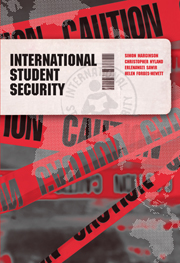Book contents
- Frontmatter
- Contents
- List of figures
- List of tables
- About the authors
- Preface
- PART 1 Students in the global market
- PART 2 Security in the formal and public domain
- 5 Finances
- 6 Work
- 7 Housing
- 8 Health
- 9 Safety of the person
- 10 The immigration department
- PART 3 Security in the informal and private domain
- PART 4 Protection and empowerment
- References
- Index
5 - Finances
Published online by Cambridge University Press: 05 August 2012
- Frontmatter
- Contents
- List of figures
- List of tables
- About the authors
- Preface
- PART 1 Students in the global market
- PART 2 Security in the formal and public domain
- 5 Finances
- 6 Work
- 7 Housing
- 8 Health
- 9 Safety of the person
- 10 The immigration department
- PART 3 Security in the informal and private domain
- PART 4 Protection and empowerment
- References
- Index
Summary
It costs money to live here in Australia. Having a budget is very important, and keeping to budget and living within one's means. Living within your means is the safest thing to do here, because if you run out of money I don't know where you can get help. If I ran out of money at home I would go to the village and it's alright. The neighbours would come with a bowl of food for me to eat. I wouldn't be hungry.
~ female, 40, PhD gender studies, Papua New GuineaINTRODUCTION: ‘IF YOU PRICK US, DO WE NOT BLEED?’
In February 2007 the Australian Vice-Chancellor's Committee (AVCC) reported the findings of a national study titled Australian University Student Finances 2006. The objective was to clarify the ‘financial situation of Australian students’. The reader might assume the report was focused on students enrolled at Australian universities. But this was only partly true. The international students who constituted 25 per cent of students in Australian universities were excluded. The questionnaire used for the study stated that ‘This survey is only for domestic students, if you are an international student please do not complete the survey’. Professor Glen Withers of Universities Australia (UA), the rebadged AVCC, defended the exclusion of international students by stating the project was focused on improving income support for domestic students.
- Type
- Chapter
- Information
- International Student Security , pp. 89 - 113Publisher: Cambridge University PressPrint publication year: 2010



